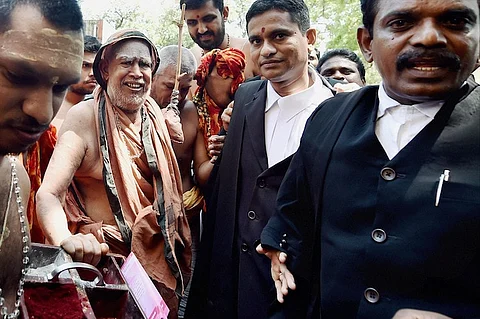

The Shankaracharya of the Kanchi Kamakoti Peetham, Sri Jayendra Sarawasthi, who died in Kanchipuram after a brief illness at the age of 82 will be remembered as the pontiff who took the mutt to the masses and sought to unite the Hindu community divided on caste lines, but not without controversies.
Jayendrar was not keeping well for over a month and was rushed to a Kanchipuram hospital after he complained of breathlessness. He was unconscious when he was brought to the hospital. He died a few hours later.
The mutt announced that the Acharya “attained siddhi at 9am today in Kanchi Kamakoti Peetham” and last rites would be performed on Thursday. He would be buried alongside the Senior Shankaracharya Chandrasekharananda Saraswathi inside the mutt premises according to the practice.
Born Subramanyam Mahadeva Iyer in a village in Tiruvarur on July 18, 1935, Jayendrar was initiated into the mutt as junior Shankaracharya at the age of 19 in 1954. He assumed charge as the 69th pontiff of Kanchi Kamakoti Peetham on March 22, 1994, after the passing of the senior pontiff Chandrasekharendra Sarawathi Swamigal.
Junior pontiff Vijayendra Saraswathi will succeed Jayendra Saraswathi as the 70th pontiff of the mutt, according to the mutt rules. The mutt has a record of unbroken line of 70 Acharyas.
The mutt has traditionally claimed that it was founded in Kumbakonam by Adi Shankacharya in the eighth century. However, the other six Shankaracharyas like those from Puri and Pejawar do not recognise the Kanchi mutt. Nevertheless, it had disciples all over India and among them were doyen of Carnatic music MS Subbulakshmi, former President R Venkataraman and former Chief Election Commissioner TN Seshan.
Jayendrar’s senior, Chandrasekharendra Saraswathi, also used to tour all over India, but he always kept a low profile. Jayendrar took the mutt beyond the confines of Kanchipuram and took it to the common man by founding educational institutions and hospitals for the poor.
He sought to unite the Hindus by working for the social and educational progress of Dalits. He also campaigned for a temple for Nandanar, an eighth century devotee of Chidambaram Natarajar who was barred entry into the temple because he was a cobbler. Nandanar composed verses in praise of Lord Siva and was later venerated as a saint.
Jayendera’s life was marked by two controversial events.
One was quite early on, in 1987, when he abandoned the staff and the mandal and vanished from the mutt. He was eventually traced in Talacauvery. Though he was readmitted to the order by the senior pontiff, Jayendrar stood by his conviction that service to humanity was service to God and that the mutt should not be cut off from the people.
He justified his conduct on the grounds that the mutt itself was founded on Sanatana Dharma, or an “eternal” or absolute set of religiously ordained practices incumbent upon all Hindus, regardless of class, caste or sect. Moreover, Adi Shankacharya was a proponent of the Advaita philosophy whose essence is that God is within, or Aham Brahmasmi, meaning I am Brahman. Therefore, service to humanity was service to God.
While senior pontiff Chandrasekharananda Saraswathi’s speeches in Tamil given between 1907 and 1994, compiled and titled “Deivathin Kural” (Voice of the Lord) have been translated into English as Hindu Dharma, there is no such work of Jayendrar published by the mutt.
The most critical phase of Jayendrar’s life began after he was implicated in the murder of the manager of the Kanchi Varadaraja Perumal temple, Sankararaman, who was a devotee-turned-critic. Sankararaman was found hacked to death inside the temple premises. The Sankaracharya was arrested on Diwali day, Nov 11, 2004, and charged with having engaged hirelings led by notorious gangster Appu to get rid of Sankararaman.
The case was shifted to Puducherry over fears that the Swamy might influence witnesses. After a prolonged trial, he was acquitted as most of the prosecution witnesses turned hostile. In all, 189 witnesses were examined during the trial from 2009 to 2013, out of which 89 turned hostile. On Nov 27, 2013, all the 24 accused were acquitted by the Puducherry Principal District Session, quoting lack of incriminating evidence against them. The judge observed that fair and proper trial was not performed in the case by the investigation officer due to the active involvement of SP of Kanchipuram, Premkumar IPS, who went beyond his call of duty as specified by law.
The seer was also acquitted in a related case involving a brutal assault on auditor Radhakrishnan during the same period in Chennai in September 2002. He was allegedly attacked as he was writing against the seer under a pen name. A sessions court acquitted Jayendrar and seven other accused, including his accountant Sunderasa Iyer and devotee Raghu.
One of the accused Ravi Subramaniam turned approver but turned hostile during the trial. Alleged hirelings, Appu and Kathiravan, died during the trial.
I visited Kancheepuram when Jayendara was produced in a local court to face trial in the case of the murder of Sankararaman. The seer came with his long staff and sat in the congested court hall with other accused. He was a picture of supreme resignation. But the prolonged trial took the sheen off him, until he came clean.
Jayendrar, who had wide political connections, sought to play a role in bringing about a negotiated settlement of the Babri Masjid-Ram temple dispute by holding talks with Muslim clerics and members of the All India Muslim Personal Board. Though he did not succeed in his efforts, the fact that the Muslim representatives accepted him as a mediator showed his credibility.
As Prime Minister Narendra Modi put it in his tribute, Jayendrar was at the forefront of innumerable community service initiatives and he nurtured institutions which transformed the lives of the poor and downtrodden.
The most surprising tribute came from Dravida Kazhagam leader K Veeramani. He said, “Though I have had sharp differences with the Kanchi Mutt, I condole his death.”